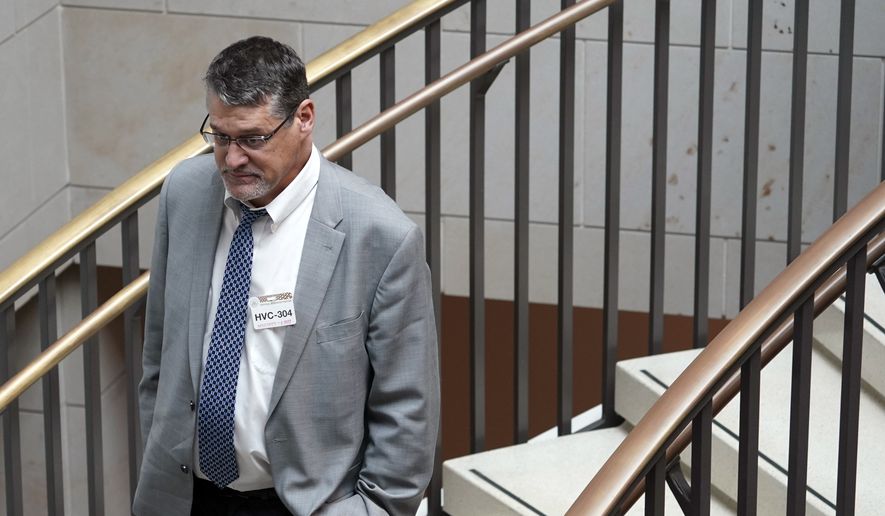Fusion GPS, the producer of the infamous Trump dossier, is fending off in court three of Russia’s richest oligarchs by painting them as corrupt bankers in bed with President Vladimir Putin.
The three primary investors in Moscow’s Alfa Bank — Mikhail Fridman, Petr Aven and German Khan — filed a libel lawsuit against Fusion in October. Fusion’s dossier, written by former British spy Christopher Steele, says two of them engineered cash bribes to Mr. Putin. The dossier also implies that the bank colluded with Mr. Putin to interfere in the 2016 U.S. presidential election by hacking Democratic Party computers.
The lawsuit describes the three billionaires as international businessmen who became “collateral damage” in Fusion’s war to destroy the Donald Trump campaign.
“This is a defamation case brought by three international businessmen who were defamed in widely disseminated political research reports commissioned by political opponents of candidate Donald Trump in the 2016 presidential election cycle,” says a Dec. 12 filing in U.S. District Court for the District of Columbia.
“The reports are gravely damaging in that, directly or by implication, they falsely accuse the plaintiffs — and Alfa, a consortium in which the plaintiffs are investors — of criminal conduct and alleged cooperation with ’Kremlin’ to influence the 2016 presidential election,” says the complaint by the New York law firm Carter Ledyard & Milburn.
Fusion responded in court by relying on Wikipedia and its press citations to paint a dark picture of three oligarchs who, the media say, capitalized on Russia’s freewheeling post-communism era to engage in financial scandals.
Fusion depicted the three as publicity-seeking financial titans who are public figures under U.S. law.
Unlike private citizens, public figures face a high bar in libel lawsuits. In this case, the Russian businessmen, if deemed public figures, must prove that Fusion spread the dossier charges with malice — meaning the opposition research firm knew its accusations were untrue or showed reckless disregard for the truth.
On that basis, lawyers from Zuckerman Spaeder asked U.S. District Judge Richard J. Leon to dismiss the lawsuit.
Alfa bank lost a libel lawsuit in the 2000s on the same grounds. It had sued the Center for Public Integrity for an article that linked Alfa to organized crime. In 2005, a judge dismissed the case, saying that while the story was flawed, the center did not show malice in its reporting.
Fusion, founded by former Wall Street Journal reporters, most notably Glenn Simpson, is in a tenacious fight in U.S. District Court and in congressional committees to protect its confidential work from prying eyes.
In addition to the libel lawsuit, Fusion’s entire dossier saga is under assault by some journalists as well as Rep. Devin Nunes, chairman of the House Permanent Select Committee on Intelligence, and Senate Judiciary Committee Chairman Chuck Grassley, Iowa Republican.
Using his subpoena power, Mr. Nunes has flushed out the Democrats and the Hillary Clinton campaign as Mr. Steele’s paymasters. Mr. Nunes’ attorneys now are in court before Judge Leon — the same judge presiding over the Fusion libel cases. He wants access to Fusion’s bank records pertaining to law firms and journalists.
Fusion’s founders have been forced to appear before the House and Senate intelligence committees. Republicans are pressing the FBI to reveal details on how it used an unverified, Democrat-funded dossier to investigate the Trump campaign. Mr. Steele bragged in one interview that he persuaded the FBI to investigate Trump people.
In the libel case, Fusion’s attorneys cited the Center for Public Integrity’s report on Alfa Bank “strongly alleging criminal connections … to corruption, organized crime and drug trafficking.”
The attorneys use parts of their court memo to provide a history of Russian oligarchy and corruption, with numerous media citations.
“Mikhail Fridman, Petr Aven and German Khan are three of the most prominent oligarchs in Russian history,” the Fusion memo states. “With their incredible wealth and political power, each has had a pronounced influence on the economic and political affairs of Russia. … Any search returns an avalanche of articles about their business endeavors, their wealth, their political and economic power, their close relationship with the Kremlin and their misconduct.”
At issue is Mr. Steele’s September 2016 writings devoted to Alfa (which he wrongly spells Alpha), one of 17 memos making up the dossier from June to December 2016.
He states that the Alfa Bank paid “illicit cash” directly from Mr. Fridman and Mr. Aven to Mr. Putin via Oleg Govorun, now a senior Kremlin figure, “throughout the 1990s.”
Mr. Govorun’s official resume states that he was an executive for Alfa only from 1997 to 2000.
Mr. Steele titled the September memo, “Presidential Election: Kremlin-Alpha Group Co-Operation.”
Much of its narration can be found in open-source material.
The Russians’ lawsuit says the dossier’s assertions “falsely accuse” the three and Alfa “of criminal conduct and alleged cooperation with the ’Kremlin’ to influence the 2016 presidential election.” It says Fusion recklessly spread the charges to journalists.
• Rowan Scarborough can be reached at rscarborough@washingtontimes.com.




Please read our comment policy before commenting.